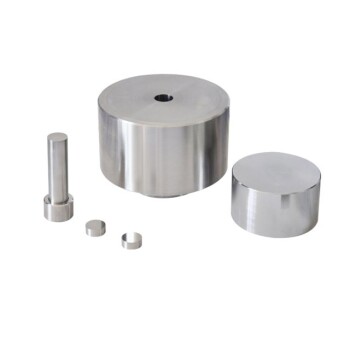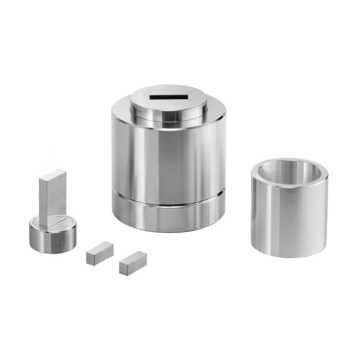At their core, a laboratory hydraulic press and an industrial hydraulic press are distinguished by their intended purpose, which dictates their design in terms of scale, force, and precision. While an industrial press is built for high-force manufacturing and production, a laboratory press is a smaller, more precise instrument designed for analytical sample preparation, materials testing, and research.
The fundamental difference is not just size, but function. An industrial press prioritizes immense force and throughput for manufacturing, whereas a laboratory press prioritizes precision and control for repeatable scientific analysis.

The Core Distinctions: Scale vs. Finesse
Although both types of presses use hydraulic fluid to generate force based on Pascal's principle, their operational priorities are worlds apart. This leads to critical differences in their construction and capabilities.
Force Capacity and Physical Footprint
Industrial presses are engineered to deliver tremendous force, often hundreds or thousands of tons, for tasks like stamping metal parts, molding materials, or forging. Consequently, they are large, heavy, and permanently installed fixtures on a factory floor.
Laboratory presses, by contrast, are designed for a much lower force range, typically up to 40 or 50 tons. Their compact, benchtop design makes them suitable for smaller lab spaces and focused tasks.
Precision and Control
This is the most critical functional difference. Laboratory presses offer superior precision and granular control over the applied force. This is essential for creating consistent, high-quality samples where exact pressure is a critical variable.
Industrial presses are built for raw power. While they have controls, they lack the fine-tuned adjustments needed for sensitive analytical work. Their focus is on applying a massive, pre-set force reliably and repeatedly.
Operational Focus
The goal of a lab press is analysis. It's used to prepare a sample or test a material to generate data, such as in quality control, research, and development.
The goal of an industrial press is production. It is a key component in a manufacturing line, designed to shape, form, or assemble products at high volume.
Where Laboratory Presses Excel: Analytical Applications
The precision of a laboratory press makes it an indispensable tool in a variety of scientific and technical fields. Its value lies in creating the ideal conditions for accurate analysis.
Sample Preparation for Spectroscopy
A primary use is pressing sample pellets for spectroscopic analysis. For Fourier Transform Infrared Spectroscopy (FTIR), a press is used to create thin, transparent KBr (potassium bromide) pellets, which requires a very specific pressure to achieve the right consistency.
Similarly, for X-Ray Fluorescence (XRF) analysis, a press is used to compact powdered materials into uniform, dense sample pellets, ensuring repeatable and accurate measurements.
Materials Science and Quality Control
In research and quality control labs, hydraulic presses are used to test the physical properties of materials. This includes testing compressive strength and durability or studying how a substance behaves under extreme, but highly controlled, pressure.
Research and Prototyping
The versatility and control of lab presses make them ideal for R&D. They can be used to prototype small-scale devices, such as microfluidics, or to investigate the effects of pressure on novel chemical compounds.
Understanding the Trade-offs
Choosing the wrong type of press is not just inefficient—it can make your objective impossible to achieve. Understanding their limitations is key.
The Limits of a Laboratory Press
A laboratory press is fundamentally unsuited for manufacturing. Its force capacity is far too low for industrial-scale forming or stamping operations. Attempting to use it for production would be ineffective and likely damage the instrument.
The Compromises of an Industrial Press
Conversely, an industrial press is the wrong tool for analytical sample preparation. It is overkill in terms of force, lacks the necessary precision to create consistent samples, and is not a cost-effective solution for a research environment. The lack of fine control would lead to poor sample quality and unreliable analytical data.
Making the Right Choice for Your Objective
Your goal dictates the correct tool. The decision between a laboratory and industrial press is a clear choice based on your specific application.
- If your primary focus is analytical sample preparation (FTIR, XRF): A laboratory press is non-negotiable for the precision and repeatability required for accurate data.
- If your primary focus is materials testing and research: A laboratory press provides the controlled environment needed to study material properties on a small scale.
- If your primary focus is high-volume manufacturing or metal forming: An industrial press is the only tool with the force capacity and durability required for production.
Understanding this core distinction ensures you invest in the right tool to achieve your specific scientific or production goals.
Summary Table:
| Aspect | Laboratory Press | Industrial Press |
|---|---|---|
| Force Capacity | Up to 40-50 tons | Hundreds to thousands of tons |
| Precision | High, for repeatable analysis | Lower, focused on raw power |
| Applications | Sample prep (FTIR, XRF), materials testing | Manufacturing, metal forming |
| Footprint | Compact, benchtop | Large, floor-mounted |
Need the right hydraulic press for your lab? KINTEK specializes in lab press machines, including automatic, isostatic, and heated lab presses, designed for precise sample preparation and materials testing. Enhance your laboratory's efficiency with our reliable equipment—contact us today to discuss your needs and discover how we can support your research and quality control goals!
Visual Guide

Related Products
- Manual Heated Hydraulic Lab Press with Integrated Hot Plates Hydraulic Press Machine
- Laboratory Hydraulic Press 2T Lab Pellet Press for KBR FTIR
- Automatic Laboratory Hydraulic Press Lab Pellet Press Machine
- Manual Laboratory Hydraulic Press Lab Pellet Press
- Laboratory Hydraulic Press Lab Pellet Press Button Battery Press
People Also Ask
- What is the role of a laboratory hydraulic press in preparing bio-based films? Achieve Precision Film Compression
- What role does a laboratory hydraulic press play in ZnO ceramics? Mastering Uniaxial Pressing for Superior Green Bodies
- What is the importance of pressure consistency in laboratory press machines? Ensure Homogeneity for Your Green Bodies
- What is the purpose of using a precision laboratory press for supercapacitors? Enhance Interface & Performance
- Why is a laboratory hydraulic press used to prepare clay mineral samples? Maximize Basal Reflection & XRD Accuracy
- Why is a laboratory hydraulic press used for titanium alloy powder compaction? Achieve High-Density Green Compacts
- How does a laboratory hydraulic press ensure the quality of PLA specimens for cone calorimetry? Achieve Accurate Data
- Why is a uniaxial laboratory hydraulic press essential for preparing SDC20 electrolyte green pellets?



















